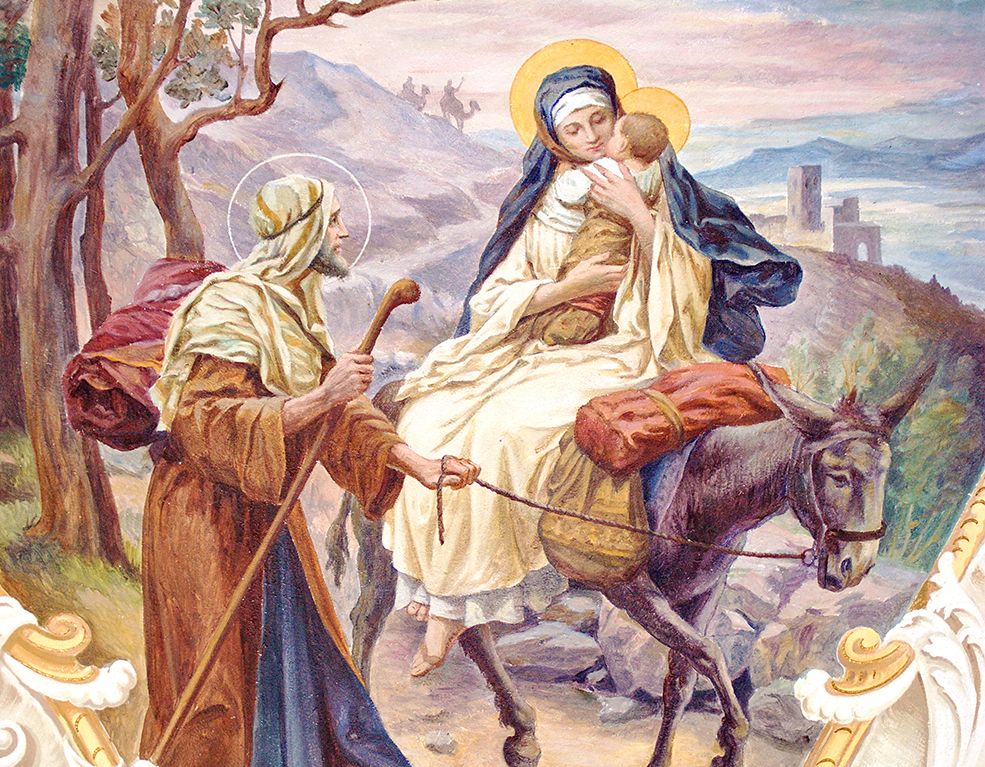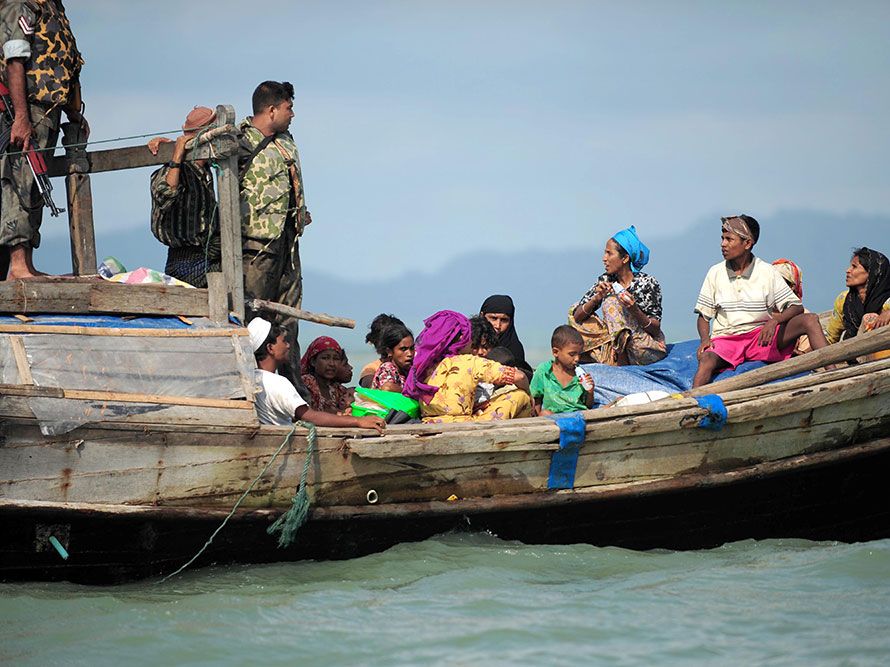Since Africa is the continent of my ministry, I cannot but open this theological reflection by mentioning the prophetic dream of the Afro-American Martin Luther King in the sixties of the last century. The United States was still marred by racial segregation and apartheid with high tension and violence. Though the background was bleak, yet his eyes and heart envisaged, on the hills of Alabama, in the profound South of the country highly hostile to harmonious integration of races, a paradisiacal vision: black and white children playing together in a not far distant future. Desmond Tutu, in 1976, in one of the darkest period of Apartheid in South Africa, the days of the Soweto massacre, didn’t yield to desperation and revenge but reinterpreted and shared the dream of a rainbow society with the thousands and thousands of South Africans assembled for the funeral of the victims. Rainbow is the symbol of the Kingdom of God whose fascination and beauty might warm up our minds and hearts in our theological reflection on diversity and unity.
Dashing experience of otherness: Independence (diversity) and Interdependence (unity). The order of the words should not be overlooked. First, diversity and then unity; not the other way round. Moreover, unity could be better replaced by the biblical koinonia and the more poetic harmony. In the world, in the cosmos, in creation what actually exists is an innumerable diversity of numberless ever-changing beings and creatures. An astounding pluralism which sets a never-ending challenge to unity/koinonia/harmony, in other words, to positive and welcomed interrelationship, to be endlessly and creatively regenerated and reinvented.
Since the Second World War, over the last sixty years or so, our human experience has been awakened to the astonishing diversity on the planet Earth and in an ever-expanding and almost boundless universe. Pope John XXIII in the epoch-making social encyclical letter, Pacem in Terris, in 1963, enriched the theological jargon with the expression sign of the times. That is a social and cultural event loaded with the values of the Kingdom of God, a sign whereby God provides a rather confused humanity and searching Church (it was the times of Vatican II) with signposts to mark the road towards a positive and life-abundant future.
The first of these signs, marked by John XXIII, was the end of colonialism with the independence and rise of many states in the South of the World especially Asia and Africa. It was not only a social event by the foundation of new states, but the recognition of the validity of their unique identity, promising subjectivity and potentials on the world stage. Independence and subjectivity were signs of the times loaded with important message for the Church and the mission. No wonder, therefore, if against this background, the Church rediscovered and regenerated the theology of adaptation, of accommodation, of contextualization, of indigenization, in other words, of inculturation of the faith. The possibility of pluralism within the One Church of Christ is the visible expression of the even greater diversity in the Kingdom of God.
Yet, together with the growing diversification sprouting from the ashes of colonial empires, grew globalization which underlined an irreversible interdependence among the more than 180 states of the United Nations. Interdependence which was then highly blown up by the great migrations with reshuffling of cultural identities: internal migrations from rural areas towards towns and metropolis; intercontinental migrations from one continent to another; all in all from the South to the North. The downfall of the Berlin Wall, with the demise of communist regimes, ignited gigantic waves of migrations also from East to West. A new distribution and mapping of peoples! The otherness of the others becomes a common day experience for all, both in gigantic metropolis and in small village. A mammoth surfacing of a new mosaic whose stones, among others, are: cultures, languages, religions, fashions, habits of eating and drinking, costumes of investing free time, cross cultural and cross religious encounters through marriage and so forth.
Christianity and the creeping culture of clashes of civilizations. The new world mentioned above, befell as a surprise on all of us inhabitants of the newly-redesigned planet Earth. All of us human beings were not ready for it! The speed of the occurrence was so fast that nobody had time to grow gradually into it through a kind of masterminded accommodation. The great religions, as well, were unprepared and taken aback by the rapid emerging epochal change leading to new patterns of anthropological and ecological seasons.
The Vatican II was a positive event of immeasurable value for the preparation of Christianity, at large, and of the Catholic Church, in particular, for a new pluralistic world and Church. The four theological Constitutions – on the Liturgy, on the Church, on the Word of God and on the Church in the World – plus other documents such as Nostra Aetate on the value of all religions in the world and Dignitatis Humanae on human rights and Unitatis Redintegratio on ecumenism grounded the foundations for the acceptance and the management of pluralistic continents and states. A new concept of catholicity emerged with the emphasis on the potentiality of the Christian faith for getting incarnated, inculturated in different human milieus without destroying the pillars of their diversity and uniqueness as had happened during the second millennium. Unfortunately, the reception of the overall message of the Vatican II went and is still going slowly and not without contradictions
No wonder, therefore, that the peoples of the world grow disoriented, easily falling as victims of the different brands of rather violent fundamentalisms. In the political arena of the North, for example, we witness the resurgence of right wing parties which are demonizing immigrants particularly from the South and are manipulating intellectual and emotional feelings of the masses of believers by identifying Christianity with the West and the North; the revival of the Tridentine Mass and rite might serve the purpose.
This transition or better the exodus from one era into the new one is rendered more difficult by the fact that the second millennium of Christianity was marred by a high degree of intolerance both within the Christian world and between Christianity and other religions. Within Christianity: 1050 – the separation and reciprocal excommunication between Rome and Constantinople, that is the western brand of Christianity and the Eastern one; 1517 – the severance of the protestant world in Northern Europe. With other religions: the crusades against the Muslim world. The Catholic Church and Christian world are right now better equipped to inspire and lead the world into a new future of positive web of relationship in a highly-diversified and highly-interdependent world and to counteract the temptations of clashes of civilization portrayed by Samuel Huntington in the nineties of the last century. Led by the great prophets mentioned above and many others, the Gospel message owns the drive of dashing away the thread of the “clash of civilizations” with the energizing dream of “rainbow of civilizations.”
Signposts in the Bible. Creation is one of the chapters of theology which undergoes high transformation and renewal due to the influence of science which casts new insight into the origin of the present world through the theories of big bang and evolution. Science challenges theology and the interpretation of the Bible no less than at the times of Galileo. It is crystal clear that the inspired writer of the first eleven chapters of the Genesis had a great admiration for diversity. The same can be spotted in other descriptions of the world such as Job 38-41.5 and Psalms 8 and 103. Human beings are different from God, man from woman, Cain and Abel, the list of nations in Chapters 5 and 10. The pluralism of nations, by all means, the rise of diversity is the core of Creation in the Bible.
The experience of diversity is at the heart of the cosmos according to God’s plan, whereas Babel is against pluralism! The temptation of the great empires is one of destroying diversity by imposing one religion, one culture, one language, one of everything. Babel symbolizes human arrogance and human project which is at loggerhead with God’s plan. Hence, the joy of the Bible vis-à-vis the downfall of empires symbolized by voracious and never satisfied dragons as found in apocalyptic books such as Daniel and Revelation. In Exodus, the twelve tribes of Israel become one people and yet they keep their identity and differences. Sin is the impossibility of communication and koinonia among differences such as God and human beings, Adam and Eve, Abel and Cain, and so forth. Reconciliation is needed, otherwise differences degenerate into aggressiveness and violence. Hence, the boundless and long-awaited need of Christ as the Mediator and Reconciler. Pentecost, with the koinonia of many languages and different peoples, is the manifestation of the victory of the Spirit of the Risen Christ. The successful entrance and penetration in human history of the Trinity, the divine mystery of the perfect symbiosis between diversity (the three Divine Persons) and unity (one God).
Strategy for a pluralistic future in the Church and the world:
PENTECOST: An all-out effort to unfold the theology and the praxis of the Holy Spirit as the first agent of evangelization and missionary activity. The Holy Spirit fills the world, the first agent of evangelization and of the renewal of the world. He is the source of diversity and communion (Eph 4, 1; 1 Cor 12; Lumen Gentium, 12). Hence, a hundred percent of exposure to the mystery of the mysteries, the Trinity: diversity and unity/koinonia/harmony as God and in God.
CONVERSION: To recognize the value of each person and all different human groups in the history of human and cosmic salvation and to live it out accordingly. The authentic evangelic conversion implies the daily acceptance of the otherness of the others which includes ongoing forgiveness and reconciliation. The same Desmond Tutu enriches his rainbow dream with the mantra uttered during his chairmanship of the Truth and Reconciliation Commission: No future without forgiveness.
PRAXIS OF LOCAL CHURCHES: The rediscovery of local churches which was lost, in a sense, in the second millennium was one of the great theological achievements of Vatican II. Without a canonical praxis of churches truly local, at least at continental level, with their own rites, theologies, spiritualities, liturgical celebrations and a certain degree of local Canon Law, there is no escape from uniformity, which is the opposite of the Catholic unity and koinonia of Churches which is advocated in this article. The continental synod, a concrete recognition of diversity, has great potentiality if it will be less centralized and its continual identity and organization will be respected.
EVOLUTION OF THE PAPAL MINISTRY: The present organization of the Roman Curia, forged during the second millennium, is redolent of the insensitivity, or better, hostility of the Church to diversity and pluralism. It would be impossible to attain a new level of harmony between diversity and unity/koinoinia/harmony without a profound revision of the high degree of centralization of the ministry of the Pope, as hinted at by John Paul II in the encyclical Ut Unun Sint.
GROWING SOLIDARITY AND COLLABORATION: Between North and South, East and West, according to the Social Teaching of the Church. In other words, the new horizons and praxis of the integration between diversity and unity/koinonia would remain abstract and not positively transformative of the present wrongly globalized world configuration, if it would not reach the levels of politics, governance and economics.
In the light of the Anamnesis of Matteo Ricci and Edinburg: 2010 is the year of the 400th anniversary of the death of Matteo Ricci, an outstanding contributor to missionary method whereby real local Churches could be founded with local element of uniqueness and yet in communion with Rome. His memory is praised by all, from the Chinese intelligentsia to the Pope. What an opportunity to devise a world configuration free from all types of imperialism, both at political and religious levels. Moreover, 2010 is, as well, the first centenary of the Conference of Edinburg, an event led by the Holy Spirit one hundred years ago. The aim was to promote acceptance of diversity within the Christian world, and to liberate the Christian missionary world from the scandalous and highly devastating competitions. Another backdrop against which the theological reflection on diversity and unity can draw inspiration.















